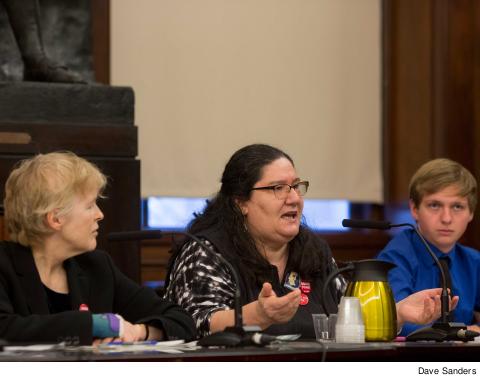Members press city, state for ‘$7K’ for adjuncts
 |
PSC activists have completed several lobby actions at the city and state level pushing for full funding of CUNY. Adjunct instructors are currently organizing for an Albany lobbying trip on April 24 focused specifically on funding the current contract demand of $7,000 per course per semester for adjuncts.
In testimony to committees and in one-on-one meetings with lawmakers, the PSC has stated what is needed to fully fund CUNY:
- “$59 million to cover the ‘TAP gap,’ caused by the law requiring CUNY to waive the difference between full-time tuition (currently $6,530 for senior college students) and $5,000 for students receiving full TAP awards. This policy has a noble goal: to shield low-income students from rising tuition costs. But it is eating an ever-larger hole in CUNY’s operating budget.”
- “$16 million to increase Community College Base Aid by $253 per FTE student. This would raise the rate to $3,000 per student and relieve pressure on the community colleges to raise tuition.”
- “$50 million to begin a three-year “CUNY Student Success Initiative” that would ultimately contribute $150 million toward hiring full-time faculty, increasing adjunct faculty salaries to $7,000 per course, hiring academic advisors, and improving advisement technology and student services.”
ALBANY IS LISTENING
“Some of [the lawmakers] were genuinely sympathetic,” Youngmin Seo, an adjunct lecturer in the social sciences department at LaGuardia Community College, told Clarion about the first March lobbying trip to Albany. “We had quite a lengthy discussion. We had a really good team.
PSC First Vice President Mike Fabricant noted, “We had more part-time faculty in Albany than we ever had before.”
Among the points adjuncts have made to lawmakers (and will do again in April) are that starting pay for adjuncts at Rutgers is $5,200 per course and $4,700 per course at the University of Connecticut, while it’s only $3,200 at CUNY. The pay, they said, must be competitive with peer institutions in the region.
New York State United Teachers President Andy Pallotta is optimistic about demanding more from the state for public higher education. Citing that the Assembly forecasted an additional $1.25 billion in tax money this year and that the Senate expects $1.47 billion in additional revenue, he said, “This additional money can also help fund a much larger investment in SUNY, CUNY and our community college system. More higher education funding is vital to covering mandatory costs and supporting these great institutions as they work toward preparing New York students for the next wave of good jobs created by a better economy.”
The city, for its part, has proposed an increase of $2.7 million for associate degree programs at the four-year colleges. During a City Council budget hearing on March 6, PSC officers testified that CUNY needs an additional $48.7 million to cover mandatory costs, $29 million additional funds to support the four-year colleges and $10 million in additional funds for associate degree students at four-year colleges receiving TAP money.
LOW ADJUNCT PAY
In her testimony to the City Council’s higher education committee, Meg Feeley, an adjunct lecturer in English at Kingsborough Community College, highlighted the need for funding for higher pay for adjuncts.
“I wish you could be with me, on the second day of classes, to see the students, their faces shining – on the second day, one young woman said she’d been up all night thinking about the topic for her final project,” she said. “I love my job, and I love my work and I love my students. But the problem of adjunctification is that it’s a race to the bottom. At Kingsborough, it continues with non-teaching adjuncts, many with newly minted bachelor’s degrees, hired for two or three days a week counseling and advising freshmen and sophomores, veterans and disabled students, because there’s a freeze in hiring full-time higher education officers.”
Adjuncts who are interested in going on the April 24 lobbying trip to demand funding for “$7K” can sign up.

